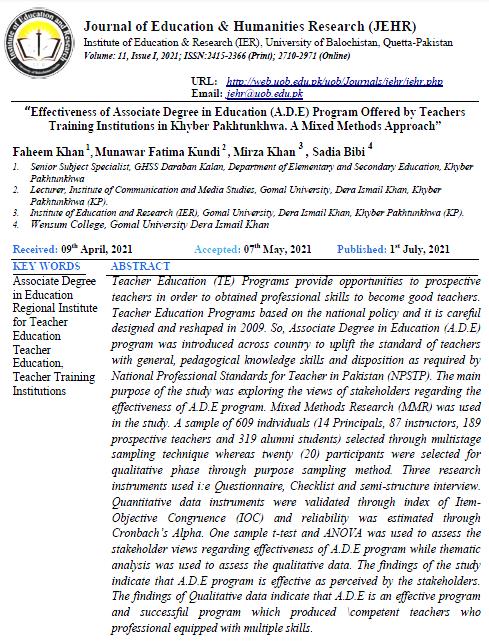Effectiveness of Associate Degree in Education (ADE) Program Offered by Teachers Training Institutions in Khyber PakhtunKhwa. A Mixed Methods Approach
Abstract
Teacher Education (TE) Programs provide opportunities to prospective teachers to received professional skills to become good teachers. Teacher Education Programs based on the national policy, therefore it is careful designed and reshaped in 2009. So, Associate Degree in Education (ADE) program was introduced across country to uplift the standard of teachers with general, pedagogical knowledge skills and disposition as required by National Professional Standards for Teacher in Pakistan (NPSTP). The main purpose of the study was exploring the views of stakeholders regarding the effectiveness of ADE program. Mixed Methods Research (MMR) was used in the study. A sample of 609 individuals (14 Principals, 87 instructors, 189 prospective teachers and 319 alumni students) was selected through multistage sampling technique whereas twenty (20) participants were selected for qualitative phase through purpose sampling method. Three research instruments was used i:e Questionnaire, Checklist and semi-structure interview. Quantitative data instruments were validated through index of Item-Objective Congruence (IOC) and reliability was estimated through Cronbach’s Alpha. One sample t-test and ANOVA was used to assess the stakeholder views regarding effectiveness of A.D.E program while thematic analysis was used to assess the qualitative data. The findings of the study indicate that A.D.E program is effective as perceived by the stakeholders. Qualitative results explored that A.D.E is a successful program to produce competent teachers who professional equipped with different skills such as communication, innovative teaching approach and assessment skills.
References
Ahmed, M. (2009). Comparative perspectives on initial primary teacher education and training
in England and Pakistan. (An Unpublished PhD Thesis). University of Hull, UK
Akbar, R. A., Akhtar, M., Hussain, A., & Abiodullah, M. (2013). Beliefs and practices of
teacher educator teaching B.Ed (Hons) and A.D.E in universities and affiliated Colleges
in Punjab. Bulletin of Education and Research, 35(2).
Al-Shahomee, A. A. (2012). A standardization of the standard progressive matrices for adult in
Libya. Personality and Individual Differences,doi:10.1016/j.paid.20111.12.042.
Chong, S., & Ho, P. (2009). Quality teaching and learning. A quality assurance framework for
Initial teacher preparation programs. International Journal of Management in Education, 3(3/4): 302-314).
Cresswell, J, W., & Plano-Clark, V. L. (2007). Designing and Conducting Mixed Methods
Research. Thousand Oaks, CA: Sage
Documentation & Institutional Assessment of DCTE. (1996-2016). Directorate of Curriculum and
Teacher Education (DCTE), Khybwe PakhtunKhw
Gall, M. D., Gall, J. P., & Borg, W. R. (2007). Educational research: An introduction.
Boston: Pearson Education.
Guest, Greg, Bunce, Arwen, Johnson., & Laura. (2006). How many interviews are enough? An
experiment with data saturation and variability. Field Methods, 18(1), 59-82
Huma, A. (2013). Interpretive analysis of new teacher education curriculum reform introduced
in Pakistan (Unpublished PhD. Thesis). USA: Michigan State University.
Irving, B. A. (1999). The Role of initial teacher training in the promotion of a lifelong learning
culture a conflict of ideals. Education and Training, 41(9)
Katitia, D., M. (2015). Teacher Education Preparation program for the 21st Century.
Which way forward for Kenya. Journal of Education and Practice, Vol.6,
No.24
Khan, S. H., & Saeed, M. (2009). Effectiveness of pre-service teacher education program (B.Ed)
in Pakistan: Perceptions of graduates and their supervisors. Bulletin of Education and
Research. Lahore, Punjab University, 31(1), 83-98.
Krejcie, R.V., & Morgan, D.W. (1970). Determining Sample Size for Research
Activities. Educational and Psychological Measurement, 30, 607-610
Lindell, M. K., and Brandt, C. J. (1997). Measuring interpreter agreement for ratings of a single
target. Applied Psychological Measurement. 21, 271–278.
Mule, L. (2006). Pre-service teachers: Inquiry in a professional development school context:
Implication for the practicum. Teaching and Teacher Education, Vol. 22 (2), pp.
-218
Reba, A. (2012). An evaluation of public sector teacher education program in Khyber
PakhtunKhwa. (Unpublished Ph.D. Thesis). Pakistan: University of Peshawar.
Vlăsceanu, L., Grünberg, L., & Pârlea, D. (2004). Quality assurance and accreditation: A
glossary of basic terms and definitions (p. 25). Bucharest: Unesco-Cepes.
Yogesh, K, S., & Nath, R. (2008). Teacher Education. New Delhi, India, A.P.H. Publishing
Corporation. (pp.121)
Zohrabi, M. (2013). Mixed Method Research: Instruments, Validity, Reliability and
Reporting Findings. Theory and Practice in Language Studies, 3(2)




